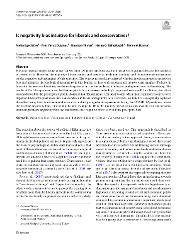| dc.contributor.author | Salter, Metin Ege | |
| dc.contributor.author | Duymac, Firat Yavuz | |
| dc.contributor.author | Yilmaz, Onurcan | |
| dc.contributor.author | Bahcekapili, Hasan G. | |
| dc.contributor.author | Harma, Mehmet | |
| dc.date.accessioned | 2023-10-19T15:12:42Z | |
| dc.date.available | 2023-10-19T15:12:42Z | |
| dc.date.issued | 2023 | |
| dc.identifier.issn | 1046-1310 | |
| dc.identifier.issn | 1936-4733 | |
| dc.identifier.uri | https://doi.org/10.1007/s12144-021-02557-y | |
| dc.identifier.uri | https://hdl.handle.net/20.500.12469/5512 | |
| dc.description.abstract | Previous research suggests that conservatives (right-wingers) tend to show more negativity bias than liberals (left-wingers) in several tasks. However, the majority of these studies are based on correlational findings and do not provide information on the cognitive underpinnings of this tendency. The current research investigated whether intuition promotes negativity bias and mitigates the ideological asymmetry in this domain in three underrepresented, non-western samples (Turkey). In line with the previous literature, we defined negativity bias as the tendency to interpret ambiguous faces as threatening. The results of the lab experiment revealed that negativity bias increases under high-cognitive load overall. In addition, this effect was moderated by the participants' political orientation (Experiment 1). In other words, when their cognitive resources were depleted, liberals became more like conservatives in terms of negativity bias. However, we failed to conceptually replicate this effect using time-limit manipulations in two online preregistered experiments during the COVID-19 pandemic, where the baseline negativity bias is thought to be already at peak. Thus, the findings provide no strong evidence for the idea that intuition promotes negativity bias and that liberals use cognitive effort to avoid this perceptual bias. | en_US |
| dc.language.iso | eng | en_US |
| dc.publisher | Springer | en_US |
| dc.relation.ispartof | Current Psychology | en_US |
| dc.rights | info:eu-repo/semantics/openAccess | en_US |
| dc.subject | Mortality Salience | En_Us |
| dc.subject | Political Orientations | En_Us |
| dc.subject | Cognitive-Style | En_Us |
| dc.subject | Thinking | En_Us |
| dc.subject | People | En_Us |
| dc.subject | Threat | En_Us |
| dc.subject | Death | En_Us |
| dc.subject | Ideologies | En_Us |
| dc.subject | Depends | En_Us |
| dc.subject | Weird | En_Us |
| dc.subject | Negativity bias | en_US |
| dc.subject | Cognitive load | en_US |
| dc.subject | Intuitive thinking | en_US |
| dc.subject | Liberal | en_US |
| dc.subject | Conservative | en_US |
| dc.subject | Threat | en_US |
| dc.title | Is negativity bias intuitive for liberals and conservatives? | en_US |
| dc.type | article | en_US |
| dc.identifier.startpage | 12374 | en_US |
| dc.identifier.endpage | 12386 | en_US |
| dc.authorid | Harma, Mehmet/0000-0002-3955-1526 | |
| dc.authorid | Salter, Metin Ege/0000-0001-9924-7529; | |
| dc.identifier.issue | 15 | en_US |
| dc.identifier.volume | 42 | en_US |
| dc.department | N/A | en_US |
| dc.identifier.wos | WOS:000737096600002 | en_US |
| dc.identifier.doi | 10.1007/s12144-021-02557-y | en_US |
| dc.identifier.scopus | 2-s2.0-85122148210 | en_US |
| dc.institutionauthor | N/A | |
| dc.relation.publicationcategory | Makale - Uluslararası Hakemli Dergi - Kurum Öğretim Elemanı | en_US |
| dc.authorwosid | Harma, Mehmet/A-3125-2015 | |
| dc.authorwosid | Salter, Metin Ege/JFB-6056-2023 | |
| dc.authorwosid | Yilmaz, Onurcan/I-3839-2019 | |
| dc.identifier.pmid | 35002183 | en_US |
| dc.khas | 20231019-WoS | en_US |
















